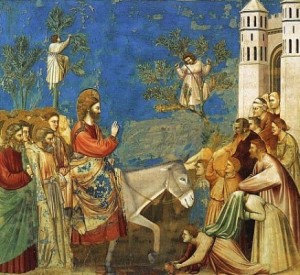Palm Sunday
 Lessons without end, at once lofty and hallowing, might be deduced from the triumphant entry of Jesus Christ into Jerusalem, celebrated by the Church on this day. We limit ourselves, however, to considering the event under one aspect merely in order to draw therefrom a moral lesson for our spiritual instruction.
Lessons without end, at once lofty and hallowing, might be deduced from the triumphant entry of Jesus Christ into Jerusalem, celebrated by the Church on this day. We limit ourselves, however, to considering the event under one aspect merely in order to draw therefrom a moral lesson for our spiritual instruction.
Our Lord enters Jerusalem, and the people forthwith improvise a triumph all the more noble because it has cost neither blood nor tears, and so much the more touching because it is spontaneous. The whole town is in commotion, the roadway is strewn with branches and covered with the garments of the bystanders, every mouth resounding with acclamations and blessings and praise. Jesus is proclaimed the Son of David, the King of the nation, and the Messiah. Ere a few days are sped, the very people that had applauded now clamor for his death, curse and insult him, and assist at his degrading death with fiendish cries of triumph.
Even thus pass away the glories of the world, its joys, its possessions, even life itself. Today at the height of greatness, tomorrow in the deepest abasement. Foolish, then, are they who would account vane things of any value, or would cling to things perishable! The Christian who places the aim of his hopes and the center of his affections at a higher plain is both wiser and more happy. Prosperity does not blind nor inebriate him, since he knows it to be capricious and mutable.
Reflection. The recommendation given by the great Apostle may be aptly brought to mind: “and they that use this world, as though they used it not; for the fashions of this world pass away.”

